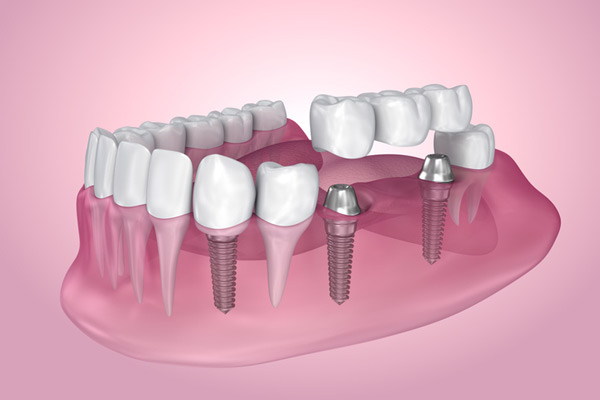How Long Do Dental Implants Last?
Portland, OR
 Dental implants have revolutionized the way we think about oral health and dental restoration. Offering a durable and aesthetically pleasing solution, they have become a popular choice for individuals seeking to replace missing or damaged teeth. Dental implants have revolutionized the way we think about oral health and dental restoration. Offering a durable and aesthetically pleasing solution, they have become a popular choice for individuals seeking to replace missing or damaged teeth.
Understanding Dental Implants
Before we examine the lifespan of dental implants, it's crucial to understand what they are and how they work. Dental implants are titanium posts surgically inserted into the jawbone, serving as a foundation for replacement teeth. They are designed to fuse with the bone, creating a strong and stable support for artificial teeth. This fusion process, known as osseointegration, is key to the durability and longevity of dental implants.
Single Tooth Dental Implants
Single tooth dental implants are used to replace individual missing teeth. This type of implant consists of a single titanium post topped with a crown, which looks a lot like your actual tooth. These implants work best for patients who have suffered the damage due to decay or disease.
Multiple Tooth Dental Implants
Multiple tooth dental implants are utilized when several adjacent teeth are missing. This solution can involve individual implants for each missing tooth or an implant-supported bridge. The latter option uses fewer implants to support multiple artificial teeth, making it a cost-effective choice for extensive restoration.
The Lifespan of Dental Implants
The longevity of dental implants is influenced by a variety of factors, including the patient's oral health, lifestyle, and the quality of post-operative care. On average, dental implants can last between 15 to 25 years, with many lasting a lifetime when properly maintained.
Factors Affecting Lifespan
Several key factors can affect the lifespan of dental implants:
| • |
Oral Hygiene: Regular brushing, flossing, and dental check-ups are crucial for maintaining implant health.
|
| • |
Lifestyle Choices: Smoking and excessive alcohol consumption can negatively impact the longevity of dental implants.
|
| • |
Bone Quality: Adequate bone density and quality are essential for implant success. Conditions such as osteoporosis can affect implant stability.
|
| • |
Medical Conditions: Certain systemic diseases, like diabetes, can impact healing and the long-term success of implants.
|
| • |
Implant Placement: The location of the implant in the mouth can influence its durability. Implants in the back of the mouth receive more strain from chewing, which can affect their longevity. |
Maintenance and Care
Proper maintenance and care are paramount for extending the life of dental implants. This includes:
| • |
Regular Dental Visits: Professional cleanings and check-ups are essential.
|
| • |
Proper Oral Hygiene: Use of soft-bristled brushes and non-abrasive toothpaste can prevent damage to the implants.
|
| • |
Avoiding Hard Foods: Chewing hard foods and ice can damage both the implant and the crown. |
Replacing Dental Implants
While dental implants are designed to be a long-term solution, there are instances when they may need to be replaced. Factors such as implant failure, infection, or bone loss can necessitate replacement. In such cases, the old implant is carefully removed, and the area is prepared for a new implant. The success of replacement implants is high, especially when the underlying issues are addressed.
Alternatives to Dental Implants
While dental implants are a popular and effective solution for tooth replacement, they may not be suitable for everyone. Various factors, including health conditions, bone density, and financial considerations, can influence the choice of dental restoration. Here are some viable alternatives to dental implants, each with its own set of advantages and considerations.
Fixed Bridges
Fixed bridges are a common alternative to dental implants for replacing one or more missing teeth. A bridge consists of one or more artificial teeth (pontics) held in place by dental crowns attached to the adjacent natural teeth. Fixed bridges are less invasive than implants since they don't require surgery for placement. However, they do require the alteration of the adjacent teeth, which must be filed down to support the bridge. While fixed bridges are durable, they typically don't last as long as dental implants and may need to be replaced every five to 15 years.
Removable Partial Dentures
Removable partial dentures are another alternative, especially suitable for patients missing multiple teeth. These dentures consist of a metal or plastic framework that supports the artificial teeth. Clasps or precision attachments hold the dentures in place, but they can be removed for cleaning and while sleeping. Partial dentures are less costly than implants and bridges, but they may be less comfortable and stable, affecting speech and eating.
Full Dentures
For patients missing all of their teeth in one or both jaws, full dentures are an option. These dentures rest on the gums and can be removed for cleaning. Advances in dental technology have made modern dentures more comfortable and natural-looking than ever before. However, they may require adjustments or replacements as the jawbone changes over time, and they can cause discomfort and difficulty in eating certain foods.
Each of these alternatives has its own set of benefits and limitations. Discussing these options with a dental professional can help determine the most suitable choice based on individual needs and circumstances.
The Future of Dental Implants
Advancements in dental technology and materials continue to improve the success rate and longevity of dental implants. Innovations such as 3D printing and the development of new biocompatible materials are paving the way for even more durable and reliable dental restoration solutions.
Long Lasting Dental Implants with Uptown Family Dental
Dental implants offer a durable and aesthetically pleasing solution for tooth replacement, with the potential to last a lifetime with proper care. Whether you're considering single tooth or multiple tooth dental implants, understanding the factors that influence their lifespan is crucial.
By maintaining good oral hygiene, making healthy lifestyle choices, and following your dentist's recommendations, you can ensure that your dental implants remain a valuable part of your smile for years to come. You can consult with Uptown Family Dental at (971) 417-2135 to determine the best course of action for the future.
|

